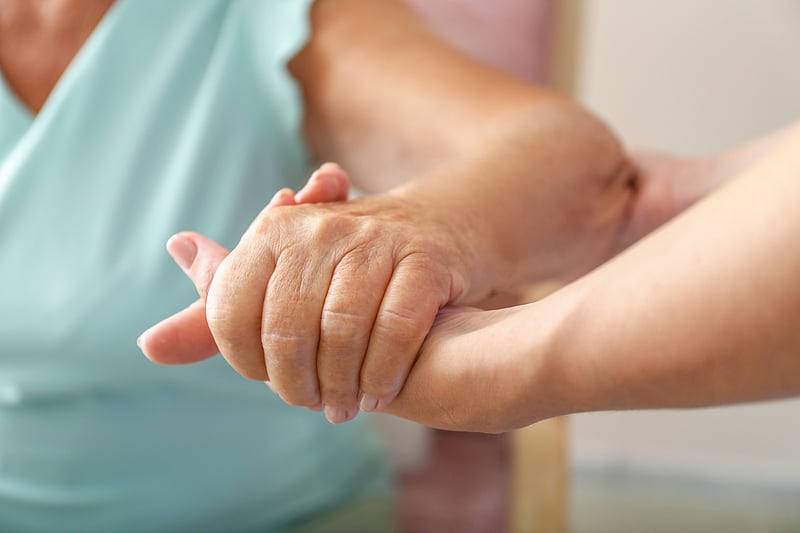Get Healthy!

- Kirstie Ganobsik
- Posted March 22, 2023
Dealing With Caregiver Stress & Burnout: A Guide
If you've been suffering from caregiver stress, you've got plenty of company.
It affects about 36% of the 53 million unpaid family caregivers in the United States, according to a recent report by the AARP and the National Alliance for Caregiving -- and it can ultimately lead to caregiver burnout.
To give you some tools to better recognize caregiver stress and burnout, let's explore some of the symptoms. Plus, experts offer several ways you can better manage caregiver stress, and when it's time to seek help to prevent it from reaching the level of burnout.
What is caregiver stress?
Caregiver stress occurs when the emotional, mental and physical impacts of being a caregiver become overwhelming.
It can happen to anyone who takes care of a person with a disability, health condition or injury or someone who is elderly. However, more women say they experience stress from caregiving than men, according to the U.S. Department of Health and Human Services Office of Women's Health.
One of the main challenges for a lot of caregivers is having too little time for themselves or their family and friends.
"Family caregivers spend an average of over 24 hours a week providing care -- that's more than an entire day you don't have for yourself,"Laura Kotler-Klein, a social work manager at the Hospital of the University of Pennsylvania, said in a Penn Medicine article.
Caregiver stress may be experienced in a variety of ways, including:
- Overeating or not eating enough
- Losing interest in the activities and people you once enjoyed
- Experiencing feelings of isolation, depression or other negative emotions
- Treating the person you're caring for poorly
- Feeling a loss of control
- Using substances like alcohol and medications to try to relieve stress.
According to the Alzheimer's Association, signs of caregiver stress may also include increased levels of irritability, anger, frustration, insomnia, anxiety and even denial of your loved one's condition.
What is caregiver burnout?
Caregiver burnout comes from caregiver stress that's left unaddressed and reaches the level of exhaustion.
The Cleveland Clinic notes that caregiver burnout may cause caregivers to experience depression, anxiety disorders, ongoing stress and fatigue. Oftentimes, people's attitude shifts from caring and positive to detached and unconcerned due to being worn out.
While everyone has a unique experience of caretaking, here are some top reasons for burnout:
- Too much workload or demand placed on the caregiver
- Too little control stemming from a shortage of resources or knowledge, such as a lack of money or not understanding how to be a caregiver
- Confusion about roles, especially if you've previously been a sibling, partner, parent or friend and must now take on an additional role with new responsibilities that are unclear
- The emotional toll of seeing a person you're caring for struggle with mental, physical or behavioral health issues
- Neglect of your own physical, mental and emotional needs due to the demands of caregiving.
"These [caretaker] responsibilities can leave you feeling overwhelmed, unhappy and isolated,"said Kotler-Klein.
How manage caregiver stress
Here are some ways to manage caretaker stress, according to Penn Medicine:
- Practice setting proper boundaries, including saying "no"when you already have enough on your plate
- Acknowledge and practice strategies to help manage your feelings of stress, such as taking a few deep breaths throughout the day
- Cook healthy meals to create positive experiences with the person in your care
- Go outside for about 10 minutes each morning and afternoon to get some fresh air and sunlight
- Prioritize time for yourself each day -- even if it's just a few minutes
- Ask for help and support from your family, friends and the health care community, including seeking professional help if you feel you need it
- Schedule time for the activities and people you enjoy.
In addition, a 2018 study showed exercising at least three times a week for six months improved stress levels and even cellular health in family caregivers.
"What caregivers need is support for healthy behaviors, because that is one of the first things to drop when you become a family caregiver,"study author and University of British Columbia associate professor Eli Puterman said in a news release when the study was published.
When caregiver stress becomes burnout
Burnout is a serious health concern. When caregiver stress becomes too much to handle and the signs of burnout appear, it's important to seek help.
If you think you may be experiencing depression, anxiety or another mental health condition due to caregiver burnout, a professional therapist can work with you to help reduce and eliminate your symptoms.
There are also services available for caretakers that the Cleveland Clinic recommends, including adult day care, home health aides, and caregiver support services. You can find helpful information and resources for caregivers at USA.gov.





